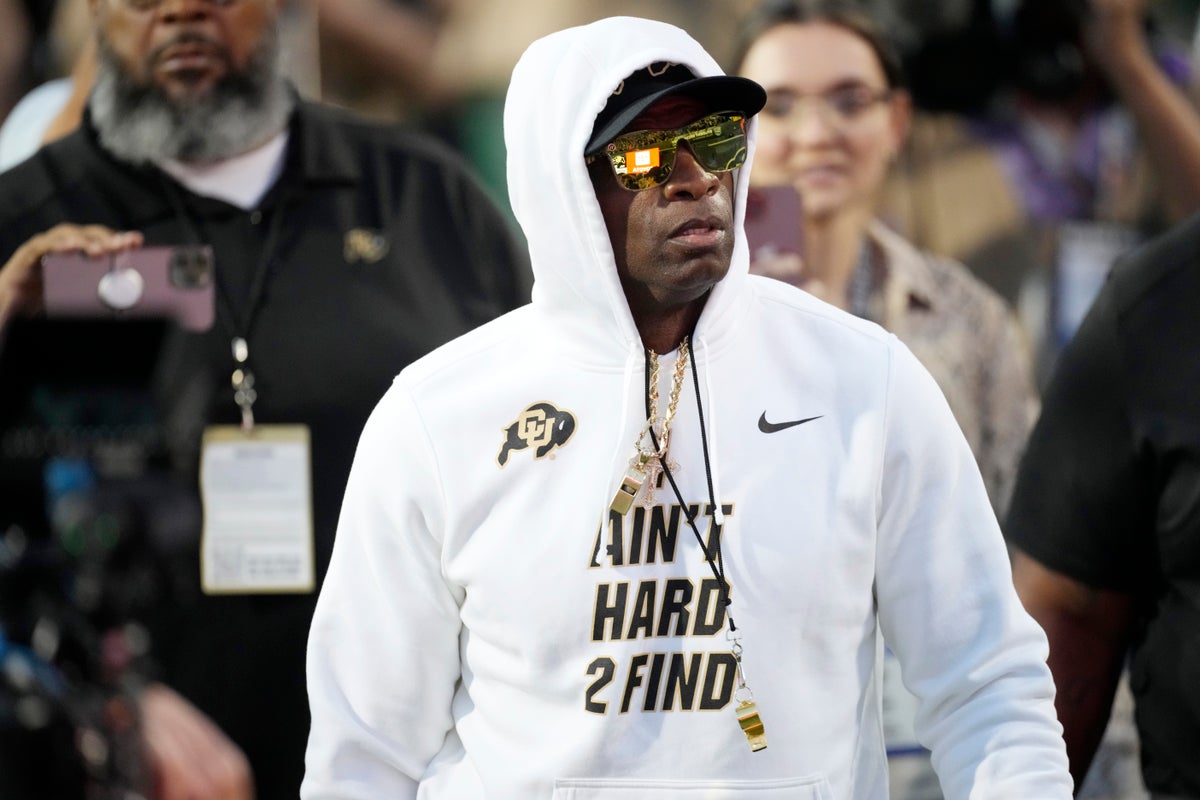
Floyd Keith has waited half a century for a Black coach with Deion Sanders’ swagger and success to shake up college football.
The fanfare and hoopla surrounding the Colorado program since Sanders' arrival has been well documented, but Keith, who for more than a decade was executive director of the Black Coaches Association, hopes the spotlight leads to opportunities for more Black coaches.
Even with a loss at Oregon on Saturday that knocked the Buffaloes out of the Top 25, Sanders has the football world’s attention. The 75-year-old Keith believes that includes decision-makers who typically have shied away from hiring Black coaches.
“There was maybe this model that everybody (thought they) had to follow,” Keith said. “There was this blueprint of the way it’s done. Well, I think Deion shattered that.”
While there is optimism there's also a healthy dose of skepticism. Sanders is a unicorn in many ways, so it's unclear if the whirlwind he has created will have coattails.
Keith never got the big break to become head coach at one the major Division I programs, but he fought tirelessly for others. He was an assistant coach at Miami (Ohio) and Colorado in the 1970s before taking over as head coach at Howard, a historically Black university. He later was the head coach at Rhode Island, a Football Championship Subdivision program.
The battle he was fighting continues today.
There are just 14 Black head coaches roaming the sidelines at the 133 Football Bowl Subdivision programs while roughly half the players are Black. Just seven of the 69 Power Five head coaching jobs are held by Black men. Notre Dame’s Marcus Freeman and Penn State’s James Franklin are the only ones leading what would be considered traditional powers.
Those jobs don't come open very often and Sanders didn't get one either.
He took over a Colorado program that won a single game last year and opened this season with victories over TCU, Nebraska and Colorado State, vaulting the Buffaloes into the national rankings while unapologetically being himself.
“Coach Prime” is usually the loudest and boldest person in the room, displaying a bravado Keith considers necessary because Black coaching talent has been overlooked for decades.
“What I judge is the results and what he’s done,” said Keith, who currently resides in Indianapolis. “I think he has taken — and I might be early in this — but I think what he’s done now is he’s opened the door for not only coaches of color, but coaches to be real. And I think that’s a great thing.”
Sanders' presence can't be ignored, and N. Jeremi Duru, director of the Washington College of Law’s Sport & Society Initiative at American University, said Sanders’ resume and swagger draws the attention needed to address the issue. Sanders was perhaps the greatest cornerback of all time, a Hall of Fame inductee at the college and pro levels and a Super Bowl champion — and was not shy about it.
Duru gives Colorado’s leadership credit for making a move that other programs wouldn’t. And he notes the results, which include record-setting television ratings.
“Who would have thought that Colorado, all the stakeholders involved in that program, would have chosen Deion?” Duru said. “And they did, and boy, are they profiting from it. It’s an extraordinary turnaround. So it may be that other organizations are more willing to take that step than have been in the past.”
Darryl Jacobs, executive director of Rising Coaches’ DEI Alliance, said there are plenty of capable Black coaches out there, with many at HBCUs. He pointed out that Sanders lost both of his trips to the Celebration Bowl — considered the national championship game for HBCUs. Jackson State lost to South Carolina State and coach Oliver Pough in 2021, then to North Carolina Central and coach Trei Oliver in 2022.
Jacobs said losses like the one at Oregon will be rare for Sanders.
“This is probably the worst team Deion Sanders is going to have because by the time he corrects that offensive and defensive line and people are calling him, there’s going to be talent there,” he said. “The sky’s the limit for them. I wouldn’t be surprised to see them competing for a national championship next year.”
As Sanders succeeds, those who have fought similar battles applaud him. Washington Commanders offensive coordinator Eric Bieniemy, a star running back for Colorado’s 1990 national championship team and former Colorado offensive coordinator, loves what he’s seeing.
“As a Black man, obviously, I’m just proud of everything that he’s accomplished,” Bieniemy said. “It’s been fun watching him do his thing, his way, and not apologize for anything that he has done or said or how his players have responded. It’s been unique watching that process.”



.png?w=600)



